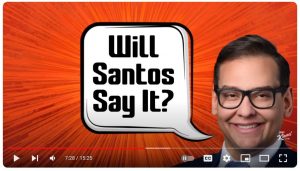Copyright Lawsuit Over Cameo Videos Fails Due to Fair Use (on a Motion to Dismiss)–Santos v. Kimmel

Nature of Use. “the defendants copied the Videos for the transformative purposes of criticism and commentary…JKL showed the Videos to comment on the willingness of Santos — a public figure who had recently been expelled from Congress for allegedly fraudulent activity including enriching himself through a fraudulent contribution scheme — to say absurd things for money.” The court says the videos acted as the proof that Santos would, in fact, say it.
Santos said that Kimmel lied to get the videos. The court says “Defendants’ conduct may have been deceptive and unkind” but, per Warhol, the fair use test doesn’t turn on subjective intent. This is true, but because fair use is an equitable defense, I could imagine other judges being more concerned about the false pretenses issue.
Nature of the Work. “Although the defendants wrote the messages, Santos added some language and original touches. Santos likely also made choices as a videographer about lighting and framing of the Videos.” That’s true–for example, the first videos are dark in a creepy way. In any case, the court says the Santos’ videos are “more expressive than factual.”
On the other hand, the court says “Santos published the Videos when he uploaded them to Cameo.” This is an interesting definition of “published.” The court says that the Cameo license allows the buyer to redistribute the videos publicly, so delivery constitutes “publication” even if the buyer never shows them to another person.
Amount Taken. “the Videos were aired in their entirety on JKL; however, here, the use was transformative. The use of the Videos to criticize and comment on a public figure would have been undermined by showing less than the entirety of the Videos, because the audience would not know whether Santos had indeed said everything in the requests.”
Market Effect. Kimmel’s republication didn’t usurp the videos’ market: “the production of criticism and satirical commentary would be stifled if users of a work were required to obtain permission from its creator.”
On balance, the court holds that Kimmel’s republication constituted fair use. On a motion to dismiss. 💣
Fraudulent Inducement. The court says Santos didn’t lose any money from Kimmel’s requests through fake accounts.
Contract Breach. The claim is subject to copyright preemption.
Implications. Santos has been widely mocked for many things, including bringing this obviously doomed lawsuit. I don’t personally get much joy out of deriding Santos. I feel more sad for the public that he successfully duped for so long.
If Santos was paying his attorney, I wonder if his enforcement costs ate up his Cameo profits, even at $400/video. (If the lawyer brought this case on contingency, well, that’s on them). If there’s a 505 fee shift, Santos definitely will end up in the negative on his Cameo activity. I personally think a 505 fee shift is appropriate any time a defendant wins fair use on a motion to dismiss. There are few clearer way for a court to say that the case wasn’t even close.
Although this is a strong defense-side win, it isn’t necessarily extensible to other circumstances. Santos is such a uniquely mockable and discredited figure that courts are going to give a lot of room to criticize him; and only a few plaintiffs would dare to bring a lawsuit this weak.
Case Citation: Santos v. Kimmel, 1:24-cv-01210-DLC (S.D.N.Y. Aug. 19, 2024)
SEPT. 2025 UPDATE: The Second Circuit affirmed the dismissal.
Note: I tested on Cameo videos in my 2021 Internet Law course. Final exam and sample answer.